Publications
The 2019 Financing for Sustainable Development Report (FSDR) of the Inter-agency Task Force on Financing for Development warns that mobilizing sufficient financing remains a major challenge in implementing the 2030 Agenda for Sustainable Development. Despite signs of progress, investments that are critical to achieving the Sustainable Development Goals (SDGs) remain underfunded and parts of the multilateral system are under strain.
The FSDR recommends that the international community should use this opportunity to reshape both national and international financial systems in line with sustainable development. If we fail to do so, we will fail to deliver the 2030…
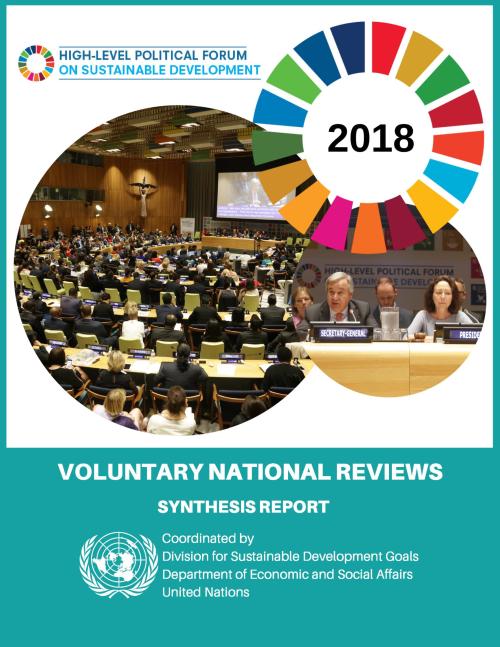
The 2018 High-Level Political Forum (HLPF) on sustainable development took place from 9 to 18 July. A total of 46 countries presented voluntary national reviews, up from 43 countries that conducted reviews in 2017. Since the inaugural reviews in 2016, 111 reviews have been presented, by 102 countries, with a number of countries conducting second reviews. Looking ahead to the 2019 HLPF, it is anticipated that 51 countries will present their national reviews, of which 41 will be doing so for the first time.
The voluntary national reviews document how countries are tackling the transformative challenge of the 2030 Agenda. The reviews are country-specific and complement the broader…
A fast-changing climate, conflict, inequality, persistent pockets of poverty and hunger and rapid urbanization are challenging countries’ efforts to achieve the Sustainable Development Goals (SDGs), according to the UN’s latest SDG progress report.
The Sustainable Development Goals Report 2018 found that conflict and climate change were major contributing factors leading to growing numbers of people facing hunger and forced displacement, as well as curtailing progress towards universal access to basic water and sanitation services.
For the first time in more than a decade, there were approximately 38 million more hungry people in the world, rising from 777 million in…
The 2018 report of the Inter-agency Task Force on Financing for Development finds that most types of development financing flows increased in 2017, and that there has been progress across all the action areas of the Addis Ababa Action Agenda. This progress was underpinned by an upturn in the world economy, but at the same time the report warns that risks could derail development progress and structural impediments continue to undermine sustainable development prospects.
The 2018 report provides policy options which, if implemented, would put the world on a sustained and sustainable growth and development path. It also examines the financing challenges to the SDGs under…
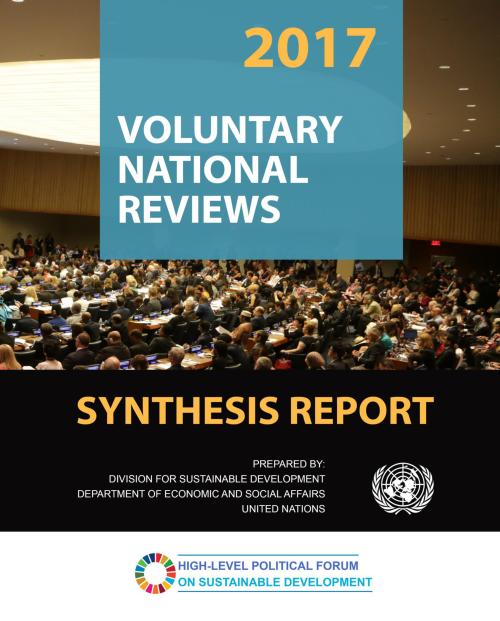
The 2017 meeting of the High-Level Political Forum on Sustainable Development (HLPF) took place from 10 to 19 July. A total of 43 countries presented voluntary national reviews, up from 22 countries that presented inaugural reviews at the 2016 HLPF. With this, more than a third of countries will have conducted a voluntary national review, sharing progress, experiences, lessons learned and challenges in implementing the 2030 Agenda. Looking ahead, at the 2018 HLPF, 47 countries will present their national reviews. Four of these will be conducting their second review at the HLPF (Colombia, Egypt, Mexico, and Switzerland) and one country its third (Togo). This report synthesizes some of the…
If the world is to eradicate poverty, address climate change and build peaceful, inclusive societies for all by 2030, key stakeholders, including governments, must drive implementation of the Sustainable Development Goals (SDGs) at a faster rate, according to the The Sustainable Development Goals Report 2017, launched by UN Secretary-General Antonio Guterres.
Using the most recent data available, the annual Sustainable Development Goals Report provides an overview of the world’s implementation efforts to date, highlighting areas of progress and areas where more action needs to be taken to ensure no one is left behind. The Sustainable Development Goals Report 2017report found that…
Continued slow global economic growth is likely to leave about 6.5 per cent of the world population extremely poor in 2030 without national actions supported by international cooperation, according to a new report issued by the United Nations today.
A continuation of the status quo would severely hamper efforts to achieve the Sustainable Development Goals by 2030. The Goals call for eliminating poverty by 2030.
According to the 2017 “Financing for Development: Progress and Prospects” report, under current trends, least developed countries (LDCs) are likely to fall short by large margins.
Projections indicating that global gross product will grow at less than 3…
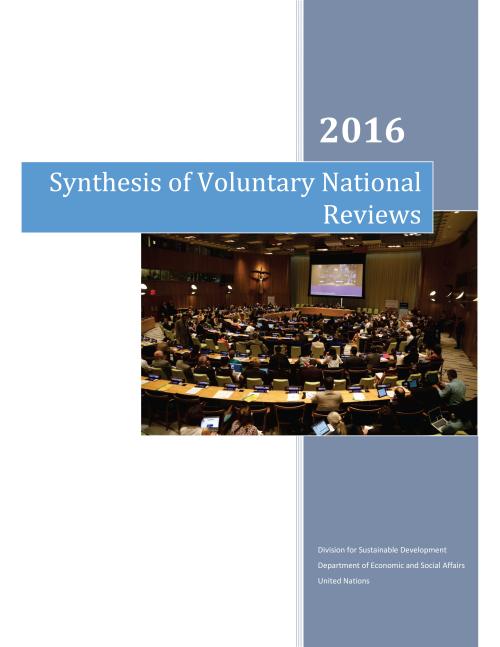
The 2016 meeting of the High-Level Political Forum (HLPF) took place from 11 to 20 July 2016 at the United Nations Headquarters in New York. Twenty-two countries presented voluntary national reviews (VNRs) of the implementation of the 2030 Agenda, and particularly the sustainable development goals (SDGs), over a day and a half during the Ministerial Segment of the HLPF under the auspices of the Economic and Social Council (ECOSOC). This report synthesizes some of the findings of the VNRs, drawing primarily from the written reports and executive summaries of the majority of countries. It uses a theme based analysis drawn largely from the voluntary common guidelines contained in the Annex…
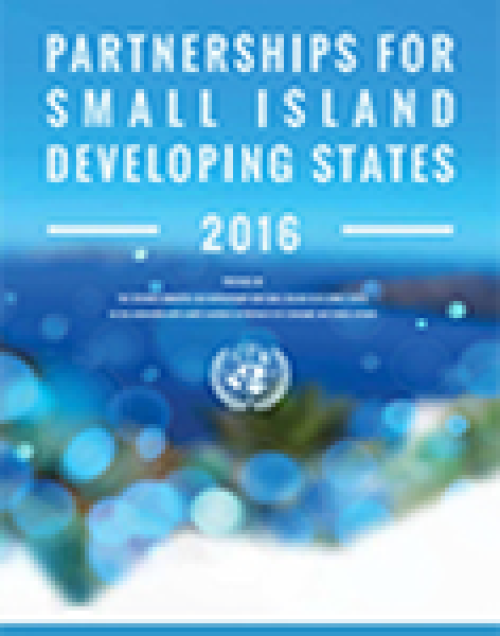
The first annual Global Multi-stakeholder SIDS Partnership Dialogue was held on 22 September 2016 during the 71st session of the General Assembly as a High-level Breakfast Event, focusing on the launch of new partnerships devoted to SIDS, and the announcement of new commitments from existing SIDS partnerships.
The Dialogue is an integral of the SIDS Partnership Framework which was launched by the General Assembly in 2016 as a follow-up to the SIDS Conference, held in Samoa in 2014. The Framework is one of a kind at the United Nations in following up and monitoring progress of voluntary commitments from multi-stakeholder partnerships aimed at driving sustainable development…
Launching the first-ever Sustainable Development Goals report on the new global development agenda adopted in 2015, Secretary-General Ban Ki-moon said that the 15-year undertaking was “off to a good start” but would require all parts of the UN family and its partners to work together.
“We have embarked on a monumental and historic journey,” the Secretary-General told the UN High-level Political Forum on Sustainable Development (HLPF), which opened on 11 July and ended on 20 July 2016, at the UN Headquarters in New York.
“We must all learn, in national governments, in local authorities, in business and civil society, and also at the United Nations, to think differently,” he…
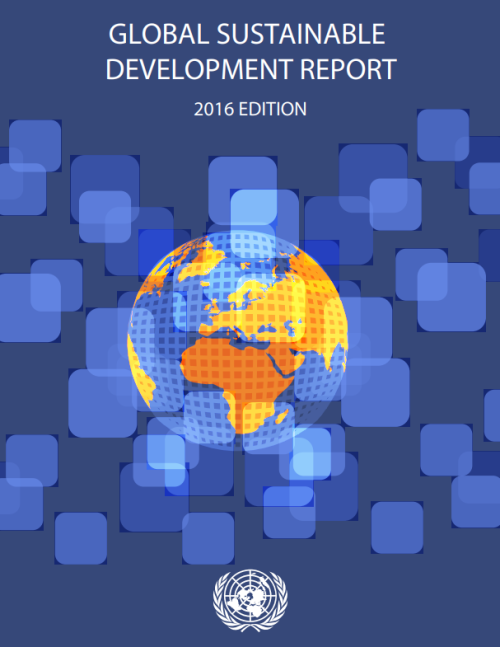
Understanding of the scientific basis for action will be needed to achieve the ambitious and transformative goals of the 2030 Sustainable Development Agenda, according to a new report issued by the United Nations today during the High-level Political Forum on Sustainable Development.
According to the Global Sustainable Development Report 2016, key elements of the 2030 Agenda –such as what it will take to ensure that no one will be left behind — have yet to be thoroughly scientifically researched. The report finds that the new agenda requires asking different questions, many that have not yet been answered by the research.
The report, an assessment of a broad array of…
The first edition of the report of the Inter-agency Task Force on Financing for Development maps out the commitments and action items contained in the Addis Ababa Action Agenda and lays out how the Task Force will monitor their implementation in future years.
The Task Force has carefully gone through the full range of these commitments and action items to create a framework for monitoring. It compiled them into nine chapters — on cross-cutting issues, the seven action areas of the Addis Agenda, and on data. In each chapter, commitments and actions are organized by thematic clusters, for which the Task Force presents options for monitoring.
 Welcome to the United Nations
Welcome to the United Nations